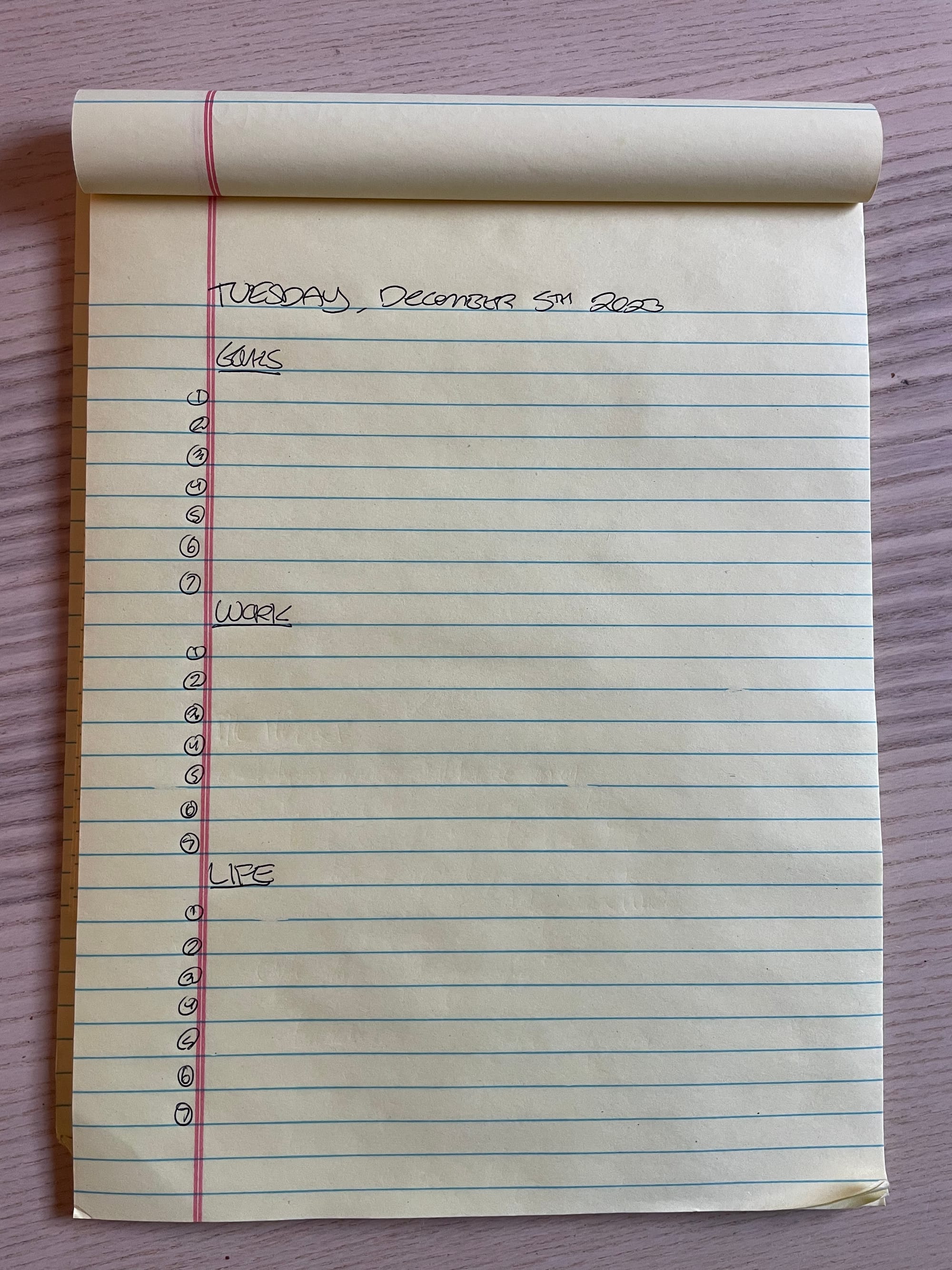
Mindset & Principles
Mindset isn’t just motivation or positive thinking — it’s the internal system that determines how you respond to stress, success, failure, and opportunity. Whether you realize it or not, you already have a mental framework that shapes how you work, train, love, compete, and navigate the world.
The goal isn’t to invent a perfect mindset overnight. It’s to examine the one you already have, refine it over time, and build a set of principles that make life clearer instead of more confusing. Below is the story of how I learned that lesson the hard way — and the mental framework I built on the other side of it.
I resented school as a kid but I can see now that the educational system gives you a solid foundation on life. Showing up on time, developing your talents, dealing with failure: it's the same at every stage.
Honestly though?
I failed to internalize any of that until my 20s. I didn't have an internal drive to motivate me so I used deadlines to get through life. Whether it was cramming for a big test or writing a ten page essay, I was the last minute king. I got through life OK but it was a struggle to get anything done on time.
Then I read Principles by Ray Dalio several years ago. It had a tremendous impact on how I approach life as an adult.
Point is, we all have a mental framework that we've developed subconsciously. It's a way of navigating through life that is unique to each of our experiences. It's how we react to problems, experience joy, express love or motivate ourselves to succeed.
OK, duh.
But one of the most important things you can do in life is to explore your mental framework. Deconstruct it. Consider the hard facts of reality that you have to deal with. With all of that considered, develop your own system of being. Make it clear to yourself and others. Keep evolving.
Here's mine.
I make a list of goals for each quarter (every 3 months). Monthly goals felt too short but quarterly goals felt like I could determine where I wanted my energy to go long term. I get these goals down to a page and organize it by category (i.e. Fitness, Finance, Social). I print out a few copies and stick them all over the house. At the end of each quarter I look back on how I did. The process begins again.
Typically I build on goals from the previous quarter. If I didn't accomplish anything useful, I'll reflect on why and adapt. This is the core of what I learned from Principles - it truly is OK if your way of doing things is different - just make sure it actually works for you.
Every day I write a to-do list, which is broken up between my quarterly goals, work tasks, and general life tasks (i.e. laundry, doctor's appt.).
I wake up in the morning, do a clear-headed meditation then write down my objectives. When I wander mentally throughout the day I refer back to this list - if I can complete at least one more task, that gives me enough momentum and confidence to keep going.

Here's what I try to accomplish every day. My unbreakable commitment is my Morning Routine and I've stuck to that for the last five years. Ideally I'm doing pushups and additional meditations but every day is different. but no matter what, where I am, I can commit to breathing exercises, meditation, some stretching and make a plan for the day. On the weekends that plan is usually in my head but I try to map out my objectives.
Morning Ritual
- Ideally wake up between 6:30am and 7:30am
- 3 rounds of breathwork (WHM)
- 15+ minutes of meditation
- after meditation I sit for a couple extra minutes to think through what i'm grateful for: family, friends and all that life has given me and send good vibes out to all beings everywhere. this is honestly a new thing for me but it feels natural and right.
- 5 days a week: 15+ minutes of yoga asanas
- Make daily to-do list
Throughout The Day
- Read book of choice for ~30 minutes
- 50 pushups: 5 sets of 10. i add it to my daily to-do list and bang out a set when I have down time
- get a workout in if possible: typically I follow a training program to keep me on track
- journal: I used to do it every day, now that I'm focused on building Sendō I'll write every few days after a workout or major update to record any insights and feelings. it's great to journal to get your feelings out from each day. you may not look back on it but you're expressing your feelings to the void which helps process things.
- midday meditation: 5+ minutes
- EOD meditation: 5+ minute meditation after work/towards bedtime
Endurance isn't just physical. It's mental, emotional, even spiritual.
Ask any long-distance runner, weightlifter grinding out a brutal set, or yogi holding an uncomfortable pose: your mind will quit long before your body does.
In the Sendō system—where running, strength training, and yoga intersect—the mental game is the thread that binds it all together. Whether you’re training for your first 10K or pushing through mile 80 of an ultramarathon, your mental strategies are what carry you when your legs stop believing.
Let’s break down how to build mental endurance—so you can keep moving forward, no matter what.
1. Get Comfortable Being Uncomfortable
Pain is not the enemy. It’s information.
The burning in your quads? The pounding heart? The screaming lungs? That’s your body adapting in real time. The trick is not to run from discomfort, but to sit with it. Observe it. Even respect it.
Mantra: “This is where I grow.”
Try This:
- During hard efforts, rate your discomfort from 1 to 10.
- Learn to stay calm at a 6, 7, or even 8—not just physically, but mentally.
- Remind yourself: "This isn’t forever. This is training."
2. Break the Task Into Chunks
Big goals are overwhelming. The secret is to zoom in.
Don’t think “I have 10 more miles.”
Think: “Run to that tree.”
“Just finish this set.”
“Just breathe through this minute.”
This technique—called chunking—helps prevent mental burnout.
Try This:
- In a long run, count light poles, song lengths, or minutes instead of miles.
- During a workout, say “one more rep” instead of “two more rounds.”
Small wins = sustained momentum.
3. Use Mantras & Self-Talk
What you say to yourself matters—especially when you’re suffering.
Negative self-talk kills performance.
Positive self-talk? It literally reduces perceived effort and increases pain tolerance.
Choose a phrase that resonates with you and repeat it when the going gets tough.
Examples:
- “Strong and steady.”
- “I’ve done harder things.”
- “One breath, one step.”
Make it short, rhythmic, and personal.
4. Visualize the Win
Elite athletes use visualization not because it’s “woo”—but because it works.
Your brain doesn’t fully distinguish between real and imagined experiences. If you mentally rehearse a hard run or a successful lift, you prime your nervous system to follow through when it’s real.
Try This:
- Before a race or hard workout, close your eyes and walk through it in your mind:
- See yourself relaxed at the start.
- Feel the tension in your legs.
- Watch yourself push through the wall—and finish strong.
Do this 2–3x a week for 2–5 minutes. You’ll be shocked at how much calmer and more confident you feel on game day.
5. Control What You Can
You can’t control the weather, terrain, or how you slept last night.
But you can control your effort, attitude, breathing, and focus.
When things get messy, return to these basics. Breathe intentionally. Reset your posture. Focus on one small thing you can do well right now.
Your mindset is a dial, not a switch. Keep adjusting it.
6. Practice Presence (the Mind-Body Link)
Endurance is meditation in motion.
You’re either in the moment… or in your own way.
This is where yoga, breathwork, and mindfulness training become your endurance edge.
Try This:
- Match your breath to your movement (e.g., inhale for 3 steps, exhale for 3).
- Tune in to sensations without judgment—just feel.
- Repeat: “Right here, right now.”
The body follows the mind. And the mind follows the breath.
7. Train in the Dark So You Can Race in the Light
Mental strength is a skill—and it’s built when no one’s watching.
Wake up early. Run in the rain. Lift when you’re sore.
Those sessions? That’s where your edge is sharpened.
The goal isn’t just to grit through the pain. It’s to become someone who doesn’t fold when it shows up.
Discomfort becomes familiar. Fear becomes fuel.
8. Know Your Why
When your legs are toast, and your heart feels like it’s going to burst, you need something deeper than discipline.
You need purpose.
Why are you doing this?
- To grow?
- To heal?
- To prove to yourself that you can?
Write it down. Say it out loud. Etch it into your bones.
When the wall hits, your why pulls you through.
Mental Strategies, Summed Up
Here’s a checklist to keep in your training log or pinned in your gym:
✅ Embrace discomfort—don’t fear it
✅ Chunk big goals into smaller pieces
✅ Use short, powerful mantras
✅ Visualize the hard parts and the finish
✅ Focus on what you can control
✅ Stay present with breath and form
✅ Do the hard things—consistently
✅ Anchor yourself in your “why”








Subscribe to get updates on new content, merch and more from Sendō Worldwide.
Browse the Online Shop for apparel, accessories and training books to equip yourself for the path ahead.
Have a tip, story, or idea? It could end up in a future post. Email me anytime with questions, thoughts, or even confessions — we're all in this together.








